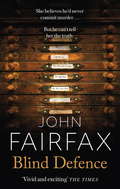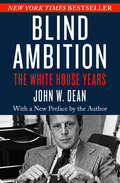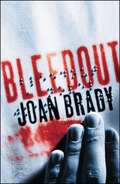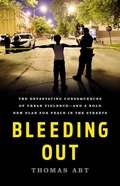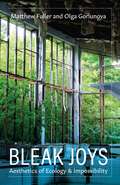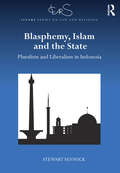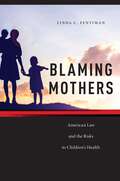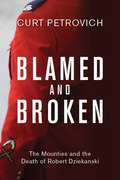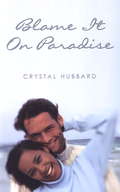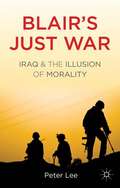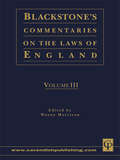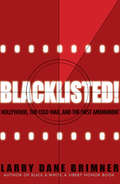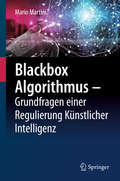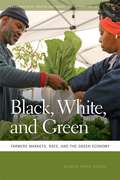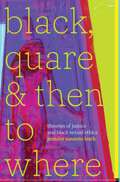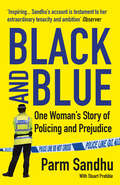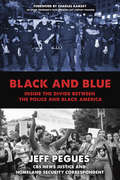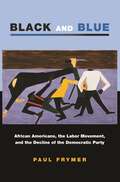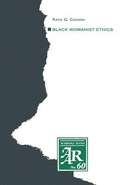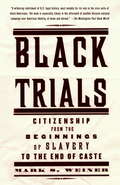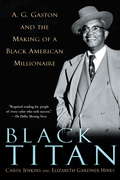- Table View
- List View
Blind Defence (Benson and De Vere)
by John Fairfax'Vivid and exciting' The TimesWINNER OF THE PRIX DU MASQUEShe was found hanging in a dingy London bedsit with a blood orange in her mouth. Diane Heybridge, a young woman without a past or much of a future, has captured in death the compassion denied her in life. For the prosecution, this seeming suicide is nothing more than a bungled killing and a disgusted public looks to Court 2 of the Old Bailey for justice. Her callous, jilted partner Brent Stainsby stands accused of her murder and he's turned to the maverick legal team William Benson and Tess de Vere to defend him. However, as the trial unfolds it soon becomes clear that there is far more to Diane Heybridge than meets the eye. She wasn't the weak and downtrodden victim now being presented to the jury. She was capable of a sophisticated form of vengeance. By the same token, Brent Stainsby isn't who he seems to be either. He's hiding a motive for murder unknown to the police and may well be playing a deadly game of poker with the judicial process. What began as a simple trial rapidly turns into a complex search for the truth beyond the confines of the courtroom...
Blind Defence (Benson and De Vere)
by John Fairfax'An all-action court drama' Sunday Times on Summary JusticeShe was found hanging in a dingy London bedsit with a blood orange in her mouth. Diane Heybridge, a young woman without a past or much of a future, has captured in death the compassion denied her in life. For the prosecution, this seeming suicide is nothing more than a bungled killing and a disgusted public looks to Court 2 of the Old Bailey for justice. Her callous, jilted partner Brent Stainsby stands accused of her murder and he's turned to the maverick legal team William Benson and Tess de Vere to defend him. However, as the trial unfolds it soon becomes clear that there is far more to Diane Heybridge than meets the eye. She wasn't the weak and downtrodden victim now being presented to the jury. She was capable of a sophisticated form of vengeance. By the same token, Brent Stainsby isn't who he seems to be either. He's hiding a motive for murder unknown to the police and may well be playing a deadly game of poker with the judicial process. What began as a simple trial rapidly turns into a complex search for the truth beyond the confines of the courtroom...
Blind Defence (Benson and De Vere)
by John Fairfax'Vivid and exciting' The TimesWINNER OF THE PRIX DU MASQUEShe was found hanging in a dingy London bedsit with a blood orange in her mouth. Diane Heybridge, a young woman without a past or much of a future, has captured in death the compassion denied her in life. For the prosecution, this seeming suicide is nothing more than a bungled killing and a disgusted public looks to Court 2 of the Old Bailey for justice. Her callous, jilted partner Brent Stainsby stands accused of her murder and he's turned to the maverick legal team William Benson and Tess de Vere to defend him. However, as the trial unfolds it soon becomes clear that there is far more to Diane Heybridge than meets the eye. She wasn't the weak and downtrodden victim now being presented to the jury. She was capable of a sophisticated form of vengeance. By the same token, Brent Stainsby isn't who he seems to be either. He's hiding a motive for murder unknown to the police and may well be playing a deadly game of poker with the judicial process. What began as a simple trial rapidly turns into a complex search for the truth beyond the confines of the courtroom...
Blind Ambition: The White House Years
by John W. DeanA six-month New York Times bestseller: &“Not only the best Watergate book, but a very good book indeed&” (The Sunday Times). As White House counsel to Richard Nixon, a young John W. Dean was one of the primary players in the Watergate scandal—and ultimately became the government&’s key witness in the investigations that ended the Nixon presidency. After the scandal subsided, Dean rebuilt his career, first in business and then as a bestselling author and lecturer. But while the events were still fresh in his mind, he wrote this remarkable memoir about the operations of the Nixon White House and the crisis that led to the president&’s resignation. Called &“fascinating&” by Commentary, which noted that &“there can be little doubt of [Dean's] memory or his candor,&” Blind Ambition offers an insider&’s view of the deceptions and machinations that brought down an administration and changed the American people&’s view of politics and power. It also contains Dean&’s own unsparing reflections on the personal demons that drove him to participate in the sordid affair. Upon its original publication, Kirkus Reviews hailed it &“the flip side of All the President&’s Men—a document, a minefield, and prime entertainment.&” Today, Dean is a respected and outspoken advocate for transparency and ethics in government, and the bestselling author of such books as The Nixon Defense, Worse Than Watergate, and Conservatives Without Conscience. Here, in Blind Ambition, he &“paints a candid picture of the sickening moral bankruptcy which permeated the White House and to which he contributed. His memory of who said what and to whom is astounding&” (Foreign Affairs).
Bleedout
by Joan BradyHugh Freyl is a blind lawyer, scion of Illinois' most influential family. He recounts this story from the grave. David Marion is Freyl's protege and a young convicted killer whose release from prison Freyl has orchestrated. He now stands accused of Hugh Freyl's murder. None from Freyl's powerful inner circle will stand up for David's innocence. The perfect scapegoat for their misdoings, he alone bears the burden of proof. Revealing the inner-workings of an untouchable elite with all their tricks, entitlements and intricate financial schemes, Brady shows us a place that could be any small American city - a place where innocence can backfire and where fear is the only effective weapon against a corrupt government.
Bleeding Out: The Devastating Consequences of Urban Violence--and a Bold New Plan for Peace in the Streets
by Thomas AbtFrom a Harvard scholar and former Obama official, a powerful proposal for curtailing violent crime in America Urban violence is one of the most divisive and allegedly intractable issues of our time. But as Harvard scholar Thomas Abt shows in Bleeding Out, we actually possess all the tools necessary to stem violence in our cities.Coupling the latest social science with firsthand experience as a crime-fighter, Abt proposes a relentless focus on violence itself -- not drugs, gangs, or guns. Because violence is "sticky," clustering among small groups of people and places, it can be predicted and prevented using a series of smart-on-crime strategies that do not require new laws or big budgets. Bringing these strategies together, Abt offers a concrete, cost-effective plan to reduce homicides by over 50 percent in eight years, saving more than 12,000 lives nationally. Violence acts as a linchpin for urban poverty, so curbing such crime can unlock the untapped potential of our cities' most disadvantaged communities and help us to bridge the nation's larger economic and social divides.Urgent yet hopeful, Bleeding Out offers practical solutions to the national emergency of urban violence -- and challenges readers to demand action.
Bleak Joys: Aesthetics of Ecology and Impossibility (Posthumanities #53)
by Matthew Fuller Olga GoriunovaA philosophical and cultural distillation of the bleak joys in today&’s ambivalent ecologies and patterns of lifeBleak Joys develops an understanding of complex entities and processes—from plant roots to forests to ecological damage and its calculation—as aesthetic. It is also a book about &“bad&” things, such as anguish and devastation, which relate to the ecological and technical but are also constitutive of politics, the ethical, and the formation of subjects.Avidly interdisciplinary, Bleak Joys draws on scientific work in plant sciences, computing, and cybernetics, as well as mathematics, literature, and art in ways that are not merely illustrative of but foundational to our understanding of ecological aesthetics and the condition in which the posthumanities are being forged. It places the sensory world of plants next to the generalized and nonlinear infrastructure of irresolvability—the economics of indifference up against the question of how to make a home on Planet Earth in a condition of damaged ecologies. Crosscutting chapters on devastation, anguish, irresolvability, luck, plant, and home create a vivid and multifaceted approach that is as remarkable for its humor as for its scholarly complexity.Engaging with Deleuze, Guattari, and Bakhtin, among others, Bleak Joys captures the modes of crises that constitute our present ecological and political condition, and reckons with the means by which they are not simply aesthetically known but aesthetically manifest.
Blasphemy, Islam and the State: Pluralism and Liberalism in Indonesia (ICLARS Series on Law and Religion)
by Stewart FenwickThis book draws on the work of Rawls to explore the interaction between faith, law and the right to religious freedom in post-Soeharto Indonesia, the world’s largest democracy after India and the United States. It argues that enforcement of Islamic principles by the state is inconsistent with religious diversity and the country’s liberal constitution. The book thus contributes to understanding the role of religion in the development of democracy in the world’s largest Muslim nation. A key objective is to test the argument that Rawls’ thinking about public reason cannot apply to the case of Indonesia, and Muslim states more broadly. The book therefore contributes to emerging scholarship that considers Rawls in a Muslim context. In addition to examining public reason in detail and considering critiques of the concept, the work highlights the fact that the theory was created to deal with value pluralism and is therefore relevant in any religious setting, including an Islamic one. In doing so, it emphasises that Islam is multifaceted and demonstrates the difficulties, and negative consequences, of integrating faith and law in a liberal state.
Blaming Mothers: American Law and the Risks to Children’s Health (Families, Law, and Society #3)
by Linda C. FentimanA gripping explanation of the biases that lead to the blaming of pregnant women and mothers.Are mothers truly a danger to their children’s health? In 2004, a mentally disabled young woman in Utah was charged by prosecutors with murder after she declined to have a Caesarian section and subsequently delivered a stillborn child. In 2010, a pregnant woman who attempted suicide when the baby’s father abandoned her was charged with murder and attempted feticide after the daughter she delivered prematurely died. These are just two of the many cases that portray mothers as the major source of health risk for their children. The American legal system is deeply shaped by unconscious risk perception that distorts core legal principles to punish mothers who “fail to protect” their children. In Blaming Mothers, Professor Fentiman explores how mothers became legal targets. She explains the psychological processes we use to confront tragic events and the unconscious race, class, and gender biases that affect our perceptions and influence the decisions of prosecutors, judges, and jurors. Fentiman examines legal actions taken against pregnant women in the name of “fetal protection” including court ordered C-sections and maintaining brain-dead pregnant women on life support to gestate a fetus, as well as charges brought against mothers who fail to protect their children from an abusive male partner. She considers the claims of physicians and policymakers that refusing to breastfeed is risky to children’s health. And she explores the legal treatment of lead-poisoned children, in which landlords and lead paint manufacturers are not held responsible for exposing children to high levels of lead, while mothers are blamed for their children’s injuries. Blaming Mothers is a powerful call to reexamine who - and what - we consider risky to children’s health. Fentiman offers an important framework for evaluating childhood risk that, rather than scapegoating mothers, provides concrete solutions that promote the health of all of America’s children. Read a piece by Linda Fentiman on shaming and blaming mothers under the law on The Gender Policy Report.
Blamed and Broken: The Mounties and the Death of Robert Dziekanski
by Curt PetrovichA few fleeting seconds, captured on video, led to a frustrating search for justice tainted by ego, bias, and a desire for vengeance. Images of Robert Dziekanski convulsing after being shocked by a Mountie’s Taser went viral in 2007. International outrage and domestic shame followed the release of that painful video. It had taken just twenty-six seconds for four Mounties to surround and stun the Polish would-be immigrant at Vancouver International Airport. A decade later, after millions of dollars spent on an inquiry, and bungled prosecutions laden with bias and interference, the tragic impact of those fleeting seconds on the people involved — Dziekanski's mother and the four Mounties — is at last revealed.
Blair’s Just War
by Peter LeeBringing together both contemporary and historical just war concepts, Peter Lee shows that Blair's illusion of morality evaporated quickly and irretrievably after the 2003 Iraqinvasion because the ideas Blair relied upon were taken out of their historical context and applied in a global political system where they no longer hold sway.
Blackstone's Commentaries on the Laws of England Volumes I-IV
by Wayne MorrisonFirst published in 2001. Routledge is an imprint of Taylor & Francis, an informa company.
Blacklisted!: Hollywood, the Cold War, and the First Amendment
by Larry Dane BrimnerSibert award-winning author Larry Dane Brimner follows in vivid detail the story of nineteen men from the film industry who were investigated for suspected communist ties during the Cold War, and the ten who were blacklisted for standing up for their First Amendment rights and refusing to cooperate. World War II is over, but tensions between communist Soviet Union and the U.S. are at an all-time high. In America, communist threats are seen everywhere and a committee is formed in the nation’s capital to investigate those threats. Larry Dane Brimner follows the story of nineteen men—all from the film industry—who are summoned to appear before the House of Representatives Committee on Un-American Activities. All nineteen believe that the committee’s investigations into their political views and personal associations are a violation of their First Amendment rights. When the first ten of these men refuse to give the committee the simple answers it wants, they are cited for contempt of Congress and blacklisted. <P><P>Brimner brings the story of the trial and its consequences to life, giving readers an in-depth look at what it’s like to fight for the most basic of our Constitutional rights. The book includes an author’s note, a bibliography, source notes, and an index, as well as archival photographs, documents, cartoons, images, and quotations from the accused and their accusers.
Blackbox Algorithmus – Grundfragen einer Regulierung Künstlicher Intelligenz
by Mario MartiniDieses Buch liefert eine rechtswissenschaftliche Analyse der Chancen und Gefahren algorithmenbasierter Verfahren. Algorithmen, die im Maschinenraum moderner Softwareanwendungen werkeln, sind zu zentralen Steuerungsinstanzen der digitalen Gesellschaft avanciert. Immer nachhaltiger beeinflussen sie unser Leben. Ihre Funktionsweise gleicht aber teilweise einer Blackbox. Die in ihr schlummernden Risiken zu bändigen, fordert die Rechtsordnung heraus. Das Buch beleuchtet die gesellschaftlichen Gefahren einer zunehmenden gesellschaftlichen Steuerung durch Algorithmen und entwickelt erste Regulierungsideen, mit deren Hilfe sich die Wertschöpfungspotenziale automatisierter digitaler Prozesse mit den Grundwerten der Rechtsordnung versöhnen lassen.
Black, White, And Green: Farmers Markets, Race, And The Green Economy
by Alison Hope Alkon Nik Heynen Deborah Cowen Melissa WrightFarmers markets are much more than places to buy produce. According to advocates for sustainable food systems, they are also places to "vote with your fork" for environmental protection, vibrant communities, and strong local economies. Farmers markets have become essential to the movement for food-system reform and are a shining example of a growing green economy where consumers can shop their way to social change. <p><p> Black, White, and Green brings new energy to this topic by exploring dimensions of race and class as they relate to farmers markets and the green economy. With a focus on two Bay Area markets--one in the primarily white neighborhood of North Berkeley, and the other in largely black West Oakland--Alison Hope Alkon investigates the possibilities for social and environmental change embodied by farmers markets and the green economy. <p> Drawing on ethnographic and historical sources, Alkon describes the meanings that farmers market managers, vendors, and consumers attribute to the buying and selling of local organic food, and the ways that those meanings are raced and classed. She mobilizes this research to understand how the green economy fosters visions of social change that are compatible with economic growth while marginalizing those that are not. <p> Black, White, and Green is one of the first books to carefully theorize the green economy, to examine the racial dynamics of food politics, and to approach issues of food access from an environmental-justice perspective. In a practical sense, Alkon offers an empathetic critique of a newly popular strategy for social change, highlighting both its strengths and limitations.
Black, Quare, and Then to Where: Theories of Justice and Black Sexual Ethics (Religious Cultures of African and African Diaspora People)
by jennifer susanne leathIn Black, Quare, and Then to Where jennifer susanne leath explores the relationship between Afrodiasporic theories of justice and Black sexual ethics through a womanist engagement with Maât the ancient Egyptian deity of justice and truth. Maât took into account the historical and cultural context of each human’s life, thus encompassing nuances of politics, race, gender, and sexuality. Arguing that Maât should serve as a foundation for reconfiguring Black sexual ethics, leath applies ancient Egyptian moral codes to quare ethics of the erotic, expanding what relationships and democratic practices might look like from a contemporary Maâtian perspective. She also draws on Pan-Africanism and examines the work of Alice Walker, E. Patrick Johnson, Cheikh Anta Diop, Sylvia Wynter, Sun Ra, and others. She shows that together these thinkers and traditions inform and expand the possibilities of Maâtian justice with respect to Black sexual experiences. As a moral force, leath contends, Maât opens new possibilities for mapping ethical frameworks to understand, redefine, and imagine justices in the United States.
Black and Blue: One Woman's Story of Policing and Prejudice
by Parm SandhuAt the point of her retirement from the Metropolitan Police Service in 2019, Parm Sandhu was the most senior Asian woman in London's police force. She was also the only non-white female to have been promoted through the ranks from constable to chief superintendent in the Met's entire history.In this enthralling memoir, Parm chronicles her journey from life on the outskirts of Birmingham as the fourth child of immigrants from the Punjab to the upper echelons of the Met. Forced into an abusive arranged marriage aged just 16, Parm made the decision to escape to London with her newborn son and later joined the police as a constable.During her thirty-year career, Parm worked in everything from crime prevention to counter-terrorism, and she also served in the Met's police corruption unit. She played a senior organizing role in the London Olympics and was the superintendent on duty when Lee Rigby was beheaded in the street in Greenwich.However, Parm's time on the force was marked throughout with incidents of racial and gender discrimination, and, after deciding to make a stand, she found herself facing a spurious charge of gross misconduct. Black and Blue tells her shocking story and of her quest for justice in her police work and for herself. It is a story that cannot fail to inspire anyone who has experienced prejudice or abuse of any kind.
Black and Blue: Inside the Divide between the Police and Black America
by Jeff PeguesThe recent killings in Dallas, Baton Rouge, Ferguson, and elsewhere are just the latest examples of the longstanding rift between law enforcement and people of color. In this revealing journey to the heart of a growing crisis, CBS News Justice and Homeland Security Correspondent Jeff Pegues provides unbiased facts, statistics, and perspectives from both sides of the community-police divide. Pegues has rare access to top law enforcement officials throughout the country, including FBI Director James Comey and police chiefs in major cities. He has also interviewed police union leaders, community activists, and others at the heart of this crisis--people on both sides who are trying to push American law enforcement in a new direction. How do police officers perceive the people of color who live in high-crime areas? How are they viewed by the communities that they police? Pegues explores these questions and more through interviews not only with police chiefs, but also officers on the ground, both black and white. In addition, he goes to the front lines of the debate as crime spikes in some of the nation's major cities. What he found will surprise you as police give a candid look at how their jobs have changed and become more dangerous.Turning to possible solutions, the author summarizes the best recommendations from police chiefs, politicians, and activists. Readers will not only be informed but learn what they can do about tensions with police in their communities.From the Hardcover edition.
Black and Blue: African Americans, the Labor Movement, and the Decline of the Democratic Party (Princeton Studies in American Politics: Historical, International, and Comparative Perspectives #96)
by Paul FrymerIn the 1930s, fewer than one in one hundred U.S. labor union members were African American. By 1980, the figure was more than one in five. Black and Blue explores the politics and history that led to this dramatic integration of organized labor. In the process, the book tells a broader story about how the Democratic Party unintentionally sowed the seeds of labor's decline. The labor and civil rights movements are the cornerstones of the Democratic Party, but for much of the twentieth century these movements worked independently of one another. Paul Frymer argues that as Democrats passed separate legislation to promote labor rights and racial equality they split the issues of class and race into two sets of institutions, neither of which had enough authority to integrate the labor movement. From this division, the courts became the leading enforcers of workplace civil rights, threatening unions with bankruptcy if they resisted integration. The courts' previously unappreciated power, however, was also a problem: in diversifying unions, judges and lawyers enfeebled them financially, thus democratizing through destruction. Sharply delineating the double-edged sword of state and legal power, Black and Blue chronicles an achievement that was as problematic as it was remarkable, and that demonstrates the deficiencies of race- and class-based understandings of labor, equality, and power in America.
Black Women and International Law
by Jeremy I. LevittFrom Compton to Cairo, Bahia to Brixton, black women have been disproportionally affected by poverty, illiteracy, unemployment, discrimination and violence. Despite being one of the largest and geographically dispersed groups in the world, they are rarely referenced or considered as a subject of analysis in international law literature. Thus, it is vital that scholars refashion global discourse by re-conceptualizing international law and relations from their unique experiences and perspectives. This collection covers a broad range of topics and issues that examine the complex interactions - as subjects and objects - between black women and international law. The book critically explores the manifold relationship between them with a view toward highlighting the historic and contemporary ways in which they have influenced and been influenced by transnational law, doctrine, norms, jurisprudence, public policy, public discourse and global governance. It purports to unearth old law and fashion new paradigms born out of the experiences of black women.
Black Womanist Ethics
by Katie G. CannonThis study articulates the distinctive moral character of the Afro-American women's community. Beginning with a reconstructive history of the Afro-American woman's situation in America, Katie G. Cannon goes on to trace the emergence of the Black woman's literary tradition and explain its importance in expressing the moral wisdom of Black women. The life and work of Zora Neale Hurston are examined in detail for her unique contributions to the moral tradition of the Afro-American woman. A final chapter initiates a promising exchange between the works of Hurston and those of Howard Thurman and Martin Luther King, Jr.
Black Trials: Citizenship from the Beginnings of Slavery to the End of Caste
by Mark WeinerTo examine race relations and American notions of civic inclusiveness, Weiner (law, Rutgers School of Law) analyzes 14 important cases that forced the legal system and the public to reconsider the place of blacks in America. He considers famous historical cases, such as the John Brown and Scottsboro Boys trials, and less known and more recent events, such as Anita Hill's testimony at the Clarence Thomas hearing. In his final chapter, Weiner posits that the liberal vision of racial civic inclusion has been weakened by the loss of religion's emotional force. Annotation ©2004 Book News, Inc. , Portland, OR (booknews. com)
Black Titan: A.G. Gaston and the Making of a Black American Millionaire
by Carol Jenkins Elizabeth Gardner HinesThe grandson of slaves, born into poverty in 1892 in the Deep South, A. G. Gaston died more than a century later with a fortune worth well over $130 million and a business empire spanning communications, real estate, and insurance. Gaston was, by any measure, a heroic figure whose wealth and influence bore comparison to J. P. Morgan and Andrew Carnegie. Here, for the first time, is the story of the life of this extraordinary pioneer, told by his niece and grandniece, the award-winning television journalist Carol Jenkins and her daughter Elizabeth Gardner Hines.Born at a time when the bitter legacy of slavery and Reconstruction still poisoned the lives of black Americans, Gaston was determined to make a difference for himself and his people. His first job, after serving in the celebrated all-black regiment during World War I, bound him to the near-slavery of an Alabama coal mine--but even here Gaston saw not only hope but opportunity. He launched a business selling lunches to fellow miners, soon established a rudimentary bank--and from then on there was no stopping him. A kind of black Horatio Alger, Gaston let a single, powerful question be his guide: What do our people need now? His success flowed from an uncanny genius for knowing the answer. Combining rich family lore with a deep knowledge of American social and economic history, Carol Jenkins and Elizabeth Hines unfold Gaston's success story against the backdrop of a century of crushing racial hatred and bigotry. Gaston not only survived the hardships of being black during the Depression, he flourished, and by the 1950s he was ruling a Birmingham-based business empire. When the movement for civil rights swept through the South in the late 1950s and early 1960s, Gaston provided critical financial support to many activists.At the time of his death in 1996, A. G. Gaston was one of the wealthiest black men in America, if not the wealthiest. But his legacy extended far beyond the monetary. He was a man who had proved it was possible to overcome staggering odds and make a place for himself as a leader, a captain of industry, and a far-sighted philanthropist. Writing with grace and power, Jenkins and Hines bring their distinguished ancestor fully to life in the pages of this book. Black Titan is the story of a man who created his own future--and in the process, blazed a future for all black businesspeople in America.From the Hardcover edition.
Black Titan: A. G. Gaston and the Making of a Black American Millionaire
by Carol Jenkins Elizabeth Gardner HinesThe grandson of slaves, born into poverty in 1892 in the Deep South, A. G. Gaston died more than a century later with a fortune worth well over $130 million and a business empire spanning communications, real estate, and insurance. Gaston was, by any measure, a heroic figure whose wealth and influence bore comparison to J. P. Morgan and Andrew Carnegie. Here, for the first time, is the story of the life of this extraordinary pioneer, told by his niece and grandniece, the award-winning television journalist Carol Jenkins and her daughter Elizabeth Gardner Hines. Born at a time when the bitter legacy of slavery and Reconstruction still poisoned the lives of black Americans, Gaston was determined to make a difference for himself and his people. His first job, after serving in the celebrated all-black regiment during World War I, bound him to the near-slavery of an Alabama coal mine—but even here Gaston saw not only hope but opportunity. He launched a business selling lunches to fellow miners, soon established a rudimentary bank—and from then on there was no stopping him. A kind of black Horatio Alger, Gaston let a single, powerful question be his guide:What do our people need now?His success flowed from an uncanny genius for knowing the answer. Combining rich family lore with a deep knowledge of American social and economic history, Carol Jenkins and Elizabeth Hines unfold Gaston’s success story against the backdrop of a century of crushing racial hatred and bigotry. Gaston not only survived the hardships of being black during the Depression, he flourished, and by the 1950s he was ruling a Birmingham-based business empire. When the movement for civil rights swept through the South in the late 1950s and early 1960s, Gaston provided critical financial support to many activists. At the time of his death in 1996, A. G. Gaston was one of the wealthiest black men in America, if notthewealthiest. But his legacy extended far beyond the monetary. He was a man who had proved it was possible to overcome staggering odds and make a place for himself as a leader, a captain of industry, and a far-sighted philanthropist. Writing with grace and power, Jenkins and Hines bring their distinguished ancestor fully to life in the pages of this book. Black Titanis the story of a man who created his own future—and in the process, blazed a future for all black businesspeople in America.
